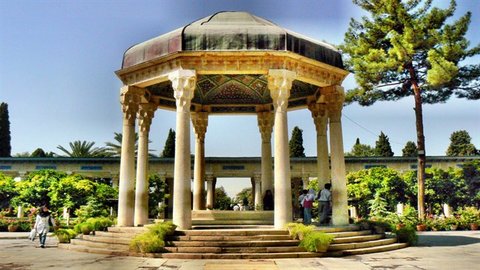The 21st commemoration ceremony of the mystic Persian poet will be held in a number of cities across Iran including his hometown Shiraz, Fars Province and Kermanshah.
The ceremony will be attended by a number of Iranian experts on Hafez, other Iranian guests and officials. Several officials as well as Hafez researchers will deliver speeches at the event.
Born in 1315, Hafez is best known for his melodious sonnets and for intertwining a taste of Persian culture into his poetry. His collected works composed of series of Persian poetry (Divan) was first translated into English in 1771 by William Jones.
Many Western writers such as Henry David Thoreau, Johann Wolfgang Goethe and Ralph Waldo Emerson have been influenced by Hafez.
In his childhood he had memorized the Qur'an by listening to his father's recitations, therefore he gained the title of Hafez (a title given to those who had memorized the Qur'an by heart. It is claimed that Hafez had done this in 14 different ways). He had also had memorized many of the works of his mentor, Sa'di, as wells as Attar, Rumi and Nezami.
His father who was a coal merchant died, leaving him and his mother with much debt. Hafez and his mother went to live with his uncle. He left day school to work in a drapery shop and later in a bakery.
While still working at the bakery, Hafez delivered bread to a wealthy quarter of town and saw Shakh-e Nabat, a young woman of incredible beauty. Many of his poems are addressed to her.
In pursuit of reaching his beloved, Hafez kept a 40 day and night vigil at the tomb of Baba Kohi. After successfully attaining this, he met Attar (not Attar Neishabouri) and became his disciple.
Hafez became a poet to the court of Abu Is'haq. Gained much fame and influence in Shiraz. This was the phase of 'Spiritual Romanticism' in his poetry.
Mobarez Mozaffar captured Shiraz, and among his various deeds, he ousted Hafez from his position of tutor of Qur'anic studies at the college. At this time he wrote his protest poems.
Shah Shoja took his tyrant father a prisoner, and re-instated Hafez as a teacher at the college. He began his phase of subtle spirituality in his poetry.
As Hafez was falling out of favor with Shah Shoja, he fled Shiraz for safety, and went into self-imposed exile in Isfahan. His poems mainly talk of his longing for Shiraz, for Shakh-e Nabat, and for his spiritual master, Attar. Some years later by invitation of Shah Shoja, he ended his exile and returned to Shiraz. He was re-instated to his post at the college.
His life and poems have been the subject of much analysis, commentary and interpretation, influencing post-fourteenth century Persian writing more than any other author.
Themes of his sonnets are the beloved, faith, and exposing hypocrisy. His influence in the lives of Persian speakers can be found in 'Hafez readings' and the frequent use of his poems in Persian traditional music, visual art and Persian calligraphy.


Your Comment